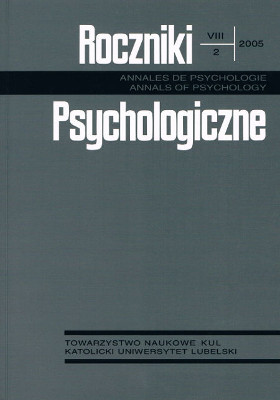The role of ideological label and political attitudes in evaluation of political message
Abstract
The role of “easy” and “hard” issues, and ideological labels in evaluation of political message are considered. In experimental research 199 Ss participated and three hypotheses were tested: 1) “Ideological symbols” hypothesis assumes that messages with label, which is consistent with addresser’ left/right self-identifications, are preferred; 2) “Issue voting” hypothesis assumes that message consistent with addresser’s “capitalist”/”socialist” view is preferred; 3) “Easy-issue voting” hypothesis assumes that addresser preferres a message containing opinion consistent with his/her view on issue of influence of Catholic Church on politics and national affairs. “Ideological symbols” hypothesis wasn’t confirmed. “Issue voting” and “Easy-issue voting” hypotheses were only partially confirmed. However, in each case Ss preferred the message that was a collection of truisms, in which concrete solutions were absent.
References
Batra, R., Ahtola, O. T. (1991). Measuring the hedonic and utilitarian sources of consumer attitudes. Marketing Letters, 2, 2, 159-170.
Bavelas J. B., Black A., Bryson L., Mullett, J. (1988). Political equivocation: A situational explanation. Journal of Language and Social Psychology, 7, 2, 137-145.
Boski, P. (1991). Jak wartości społeczno-polityczne dzieliły elektoraty pretendentów do Belwederu w wyborach prezydenckich 1990? W: Polski wyborca ’90. Psychospołeczne studia nad wyborami prezydenckimi (s. 93-123). Warszawa: Instytut Psychologii PAN.
Boski, P. (1993). O dwóch wymiarach Lewicy–Prawicy na scenie politycznej i w wartościach politycznych polskich wyborców. W: J. Reykowski (red.), Wartości i postawy Polaków a zmiany systemowe. Szkice z psychologii politycznej (s. 49-100). Warszawa: Wydawnictwo Instytutu Psychologii PAN.
Campbell, J. E. (1983). Ambiguity in the issue positions of presidential candidates: A causal analysis. American Journal of Political Science, 27, 2, 284-293.
Carmines, E. G., Stimson, J. A. (1980). The two faces of issue voting. The American Political Science Review, 74, 1, 78-91.
Chaiken, S., Maheswaran, D. (1994). Heuristic processing can bias systematic processing: Effects of source credibility, argument ambiguity, and task importance on attitude judgment. Journal of Personality and Social Psychology, 66, 3, 460-473.
Conover, P. J., Feldman, S. (1981). The origins and meaning of liberal/conservative self- -identifications. American Journal of Political Science, 25, 4, 617-645.
Converse, P. E. (1964). The nature of belief systems in mass publics. W: D. E. Apter (red.), Ideology and discontent (s. 206-261). New York: The Free Press of Glencoe.
Cwalina, W. (2000). Telewizyjna reklama polityczna. Lublin: Towarzystwo Naukowe KUL.
Cwalina, W. (2003). Co nas łączy, co nas dzieli? Motywy decyzji wyborczych Polaków (Konferencja „Transformacja systemu i zmiana człowieka”, SWPS, Jadwisin, 16-18 maja 2003).
Dalton, R. J., Wattenberg, M. P. (1993). The not so simple act of voting. W: A. Finifter (red.), The state of the discipline II (s. 193-218). Washington, DC: The American Political Science Association.
Downs, A. (1957). An economic theory of democracy. New York: Harper.
Feldman, S., Conover, P. J. (1983). Candidates, issues and voters: The role of inference in political perception. The Journal of Politics, 45, 810-839.
Fiorina, M. P., Shepsle, K. A. (1989). Is negative voting an artifact? American Journal of Political Science, 33, 2, 423-439.
Fiske, S. T., Pavelchak, M. A. (1993). Reakcje afektywne oparte na przetwarzaniu kategorialnym a reakcje afektywne oparte na przetwarzaniu analitycznym. Rozwinięcie w terminach koncepcji schematów wyzwalających afekt. W: T. Maruszewski (red.), Poznanie, afekt, zachowanie (s. 53-101). Warszawa: Wydawnictwo Naukowe PWN.
Jost, J. T., Glaser, J., Kruglanski, A. W., Sulloway, F. J. (2003). Exceptions that prove the rule – using a theory of motivated social cognition to account for ideological Incongruities and political anomalies: Reply to greenberg and jonas. Psychological Bulletin, 129, 3, 383-393.
Korzeniowski, K. (1999). Psychospołeczne uwarunkowania zachowań wyborczych. W: K. Skarżyńska (red.), Psychologia polityczna (s. 197-217). Poznań: Zysk i S-ka.
Kukliński, J. H., Hurley, N. L. (1996). It’s a matter of interpretation. W: D. C. Mutz, P. M. Sniderman, R. A. Brody (red.), Political persuasion and attitude change (s. 125-144). Ann Arbor: University of Michigan Press.
Petty, R. E., Cacioppo, J. T. (1990). Involvement and persuasion: Tradition versus integration. Psychological Bulletin, 107, 3, 367-374.
Sears D. O. (2001). The role of affect in symbolic politics. W: J. H. Kuklinski (red.), Citizens and politics. Perspectives from political psychology (s. 14-40). Cambridge: University Press.
Ziegler, R., Diehl, M. (2003). Is politician A or politician B more persuasive? Recipients’ source preference and the direction of biased message processing. European Journal of Social Psychology, 33, 623-637.
Copyright (c) 2005 Roczniki Psychologiczne

This work is licensed under a Creative Commons Attribution-NonCommercial-NoDerivatives 4.0 International License.


